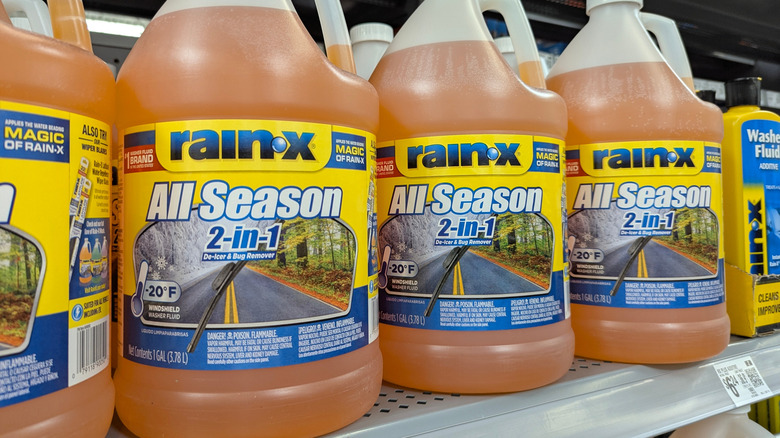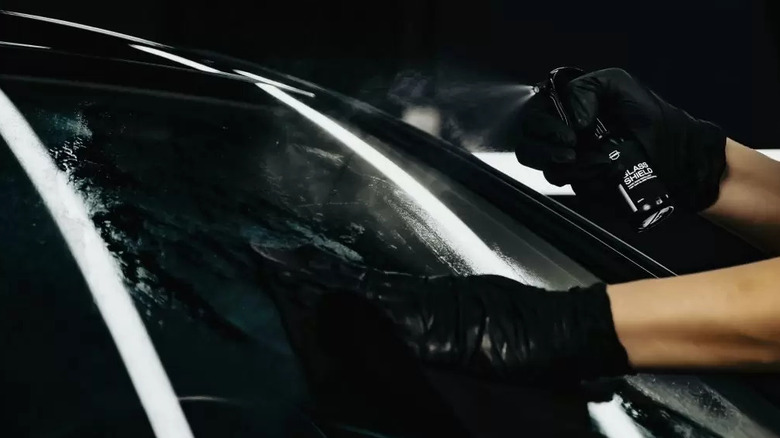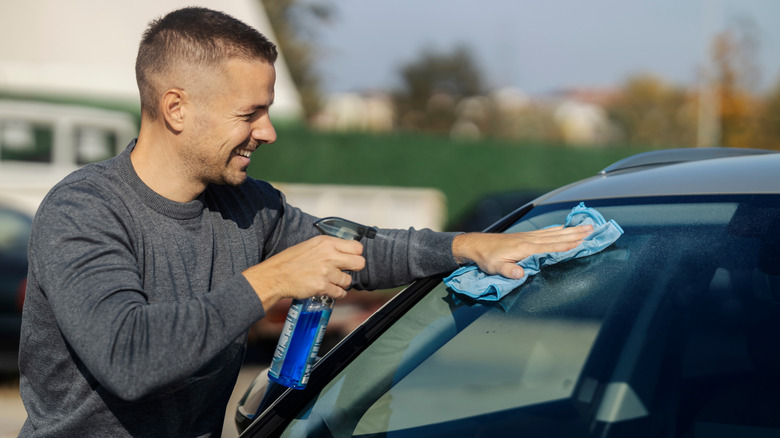Is Rain-X Bad For Your Car's Windshield? Here's What You Need To Know
Aftermarket car maintenance products are a multi-billion-dollar industry — but do these genie-in-a-bottle extras improve your car's longevity? Worse, can an aftermarket windshield coating like Rain-X actually damage your car's windshield?
Consumables like washer fluid, fuel, and oil are all part and parcel of your car's designed operation. Hydrophobic water repellent windscreen coatings? These are not usually applied at the factory, nor listed in your service schedule, so how useful can they be? It turns out some Lexus models come with water-repellent glass from the factory, and such windshields are among the many different types offered by windshield manufacturers — albeit with a luxury price tag.
Hydrophobic windshield coatings like Rain-X have wax-like properties that repel water, sleet, and snow, improving visibility by creating what manufacturers advertise as an "invisible barrier" that lets you "watch the raindrops fly off your windshield." Potential downsides include some users reporting washer fluid level sensors going awry, and urban tales of cracked windscreens, damaged windscreen seals, blitzed wiper blades, and haze. Just like the claims, the evidence is hazy at best, so we're going to assess whether the benefits outweigh the risks.
What's in the ingredients of Rain-X?
Rain-X has rain-repellent, water-beading properties, but it is neither a wax nor an oil. Rain-X and similar spray and wipe-on products use fine silicone polymers; which, as the name suggests, have a molecular backbone of silicon — not the carbon chains found in plastics, waxes, oils, and organic compounds.
Widely considered non-hazardous, silicone is so safe and chemically inert that it pops up in products ranging from cookware to human implants. The water-beading property of Rain-X does not rely on petroleum oil distillates, which are known to damage and soften rubber. And while there are many alternatives to Rain-X, it is prudent to keep any that contain crude oil byproducts away from the rubbers around your windscreen.
There have been reports — particularly in BMW and VW forums — of choked washer fluid delivery systems and sensor failure, potentially caused by Rain-X window cleaner in windscreen washer reservoirs. Such reservoirs are designed to hold washer fluids that are a mixture of distilled water, alcohol, and detergents — not silicone. Silicone polymers can build up over time and could cause a sensor to clog, so it is prudent to avoid filling your reservoir with these products if it has a sensor.
So what are the risks of using products like Rain-X?
The risk of damage to your car windshield from Rain-X is low. While some studies show trace amounts of petroleum compounds can leach out of some silicone products, we're talking about car windshields here, not baby bottles or implants. The residual petroleum and oil thrown up from the road beneath you, or the car in front of you, is more potentially damaging than using a protective product like Rain-X.
Cracked windshields, deteriorating rubber seals, and worn wiper blades are a fact of life, and will happen regardless of whether or not you put Rain-X on your windshield. Silicone polymers do not react with rubber, and there is no mechanical means by which a thin, flexible film of a low surface tension protectant could crack a windscreen. Unless you are applying Rain-X with a rock, common sense dictates we rule out a cracked windshield as a side-effect.


